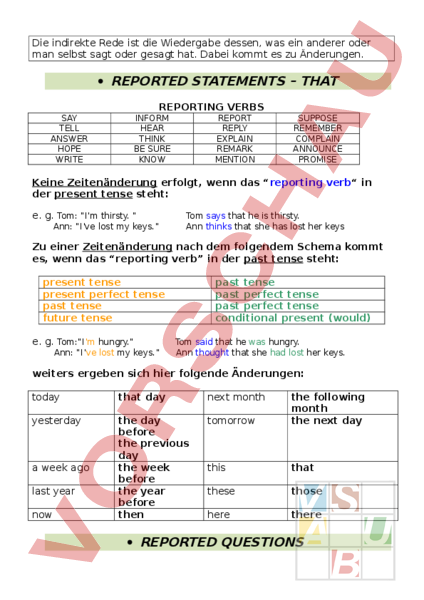Arbeitsblatt: Reported Speech
Material-Details
Grammar input
Englisch
Grammatik
8. Schuljahr
3 Seiten
Statistik
156030
569
4
13.01.2016
Autor/in
Nicole Steinkellner
Land: Schweiz
Registriert vor 2006
Textauszüge aus dem Inhalt:
Die indirekte Rede ist die Wiedergabe dessen, was ein anderer oder man selbst sagt oder gesagt hat. Dabei kommt es zu Änderungen. REPORTED STATEMENTS – THAT REPORTING VERBS SAY TELL ANSWER HOPE WRITE INFORM HEAR THINK BE SURE KNOW REPORT REPLY EXPLAIN REMARK MENTION SUPPOSE REMEMBER COMPLAIN ANNOUNCE PROMISE Keine Zeitenänderung erfolgt, wenn das reporting verb in der present tense steht: e. g. Tom: Im thirsty. Ann: Ive lost my keys. Tom says that he is thirsty. Ann thinks that she has lost her keys Zu einer Zeitenänderung nach dem folgendem Schema kommt es, wenn das reporting verb in der past tense steht: present tense present perfect tense past tense future tense e. g. Tom:Im hungry. Ann: Ive lost my keys. past tense past perfect tense past perfect tense conditional present (would) Tom said that he was hungry. Ann thought that she had lost her keys. weiters ergeben sich hier folgende Änderungen: today that day next month yesterday the day before the previous day the week before the year before then tomorrow the following month the next day this that these those here there week ago last year now REPORTED QUESTIONS Bei der Umwandlung der direkten in die indirekte Frage kommt es zu denselben Änderungen wie bei statements. Das Bindewort hängt von der Art der Frage ab: Entscheidungsfragen (Fragen ohne Fragewort) IF/WHETHER Ergänzungsfragen (Fragen mit Fragewort) FRAGEWORT e. g. Mike to Sue: Can you help me, please? Mike asked Sue whether/if she could help him. Ann to mum: Did dad repair my bike yesterday? Ann asked mum whether/if dad had repaired her bike the day before. Mum to Steve: Where have you been? Mum wanted to know where Steve had been. REPORTED IMPERATIVES Man unterscheidet zwischen requests (Bitten), suggestions (Vorschläge), advice (Ratschläge) commands (Befehle) prohibitions (Verbote), warnings Es gibt zwei Arten, den reported Imperativ zu bilden: mit einem reporting verb Infinitiv mit to mit said (that)should/shouldnt e. g. Mum to me:Help me in the kitchen, please! Mum asked me to help her in the kitchen. Dad to Joe:Go to your room at once! Dad told Joe to go to his room at once. Teacher to Carol: Dont copy your homework! The teacher told Carol NOT to copy her homework. EXERCISES: Put the following sentences into the reported speech. 1. Aunt Susan: Its time to leave. 2. Doctor at the conference: We hope we will find something against this disease. 3. We to mum: Have you been working all the time? 4. Simon to Linda: cant come to your party. have to take care of my little sister. 5. Grandma to me: Dont carry these heavy bags! 6. Our neighbours: Next week we are flying to Paris and we are going to visit the Louvre. 7. man: Ive been waiting for more than an hour but she hasnt turned up yet. 8. Teacher to us: Study this text and then write text on your own. 9. Mum to Bill: Why dont you work harder? 10. Peter to Paul: Have you ever smoked?
